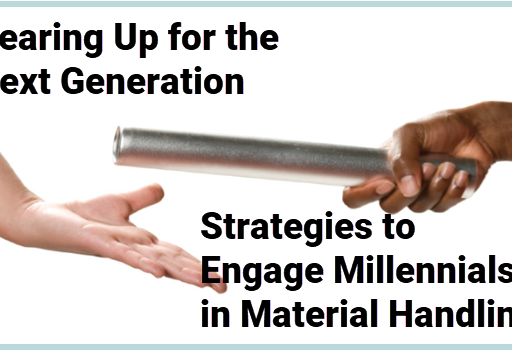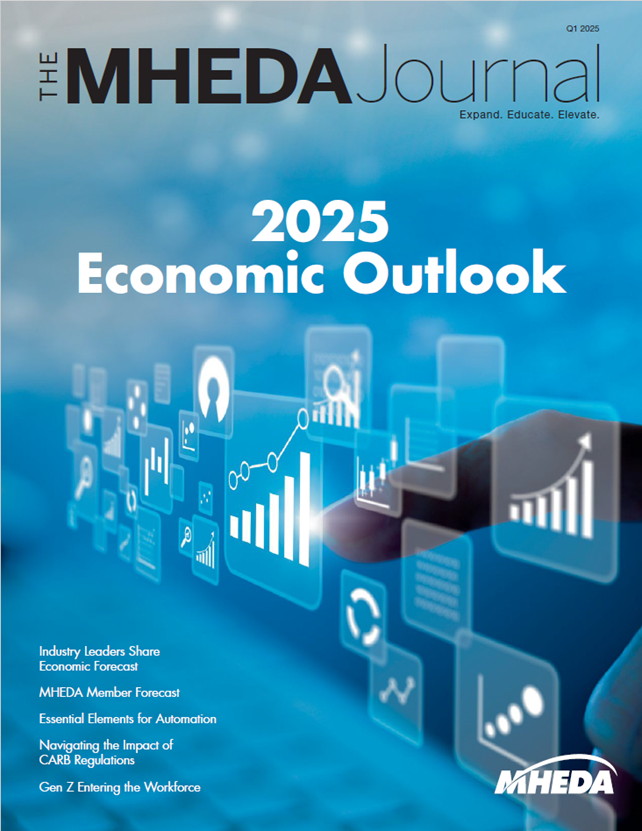Strategies to Engage Millennials in Material Handling
By Melinda Aiken
A recent IT Economics report raises a red flag – the global economic forecast is uncertain. This presents a unique challenge for the material handling industry, traditionally built on stability. Innovation and agility will be key to navigating these uncertain waters. However, amidst these headwinds lies a golden opportunity. Millennials, the generation born between 1981 and 1996, now wield immense buying power, with over $1.4 trillion in annual spending in the U.S. alone. By 2030, they’re projected to be the dominant consumer force. Understanding how to capture their attention and cater to their unique preferences, such as their focus on efficiency and technology, is paramount for success in today’s competitive market.
Material handling companies that embrace automation and data driven solutions can resonate with Millennials seeking to streamline operations and optimize their supply chains.
Decoding the New Market Landscape
Gone are the days of one-size-fits-all marketing strategies. Today, consumer behavior is in flux. A recent Salesforce report reveals that a staggering 68% of businesses are adjusting their marketing strategies in response to the economic climate. This tells us there is a need for agility and a focus on understanding evolving customer needs. But what exactly are these evolving needs for Millennials in the material handling industry? Here’s a deeper look at the general economic factors shaping Millennial behavior:
Economic Anxiety: Millennials came of age during the Great Recession, fostering a cautious approach to spending. They prioritize value and are more likely to research and compare prices before purchasing for their businesses. Material handling companies must demonstrate a clear return on investment for their products and services.
Shifting Priorities: Economic uncertainty has led Millennials to reevaluate what truly matters. They may prioritize experiences over material possessions, seeking products and services that enhance their personal and professional well-being. Material handling solutions that contribute to a more efficient and streamlined work environment can be a key selling point.
Debt Burden: Saddled with student loans and facing rising housing costs, Millennials often have less disposable income, both personally and in their business budgets. This necessitates targeting them with relevant offers and demonstrating the value proposition of your product or service in a way that directly addresses their financial constraints.
The Millennial Mindset: Values Drive Decisions
Millennials are a unique generation shaped by technological advancements, economic uncertainty and a strong social conscience. When it comes to the material handling industry, their preferences are driven by a distinct set of values:
Focus on Efficiency and Automation: Efficiency is king for Millennials. They value solutions that streamline processes, reduce costs and enhance worker safety. Technologies like automated guided vehicles, robotic picking systems and warehouse management software with user-friendly interfaces are attractive options. Material handling companies can showcase how their offerings can optimize workflow, minimize downtime and ultimately lead to increased profitability.
Data-Driven Decision-Making: Millennials are comfortable with technology and appreciate solutions that provide real-time data and analytics to optimize operations. This allows for data-driven decision making and a focus on continuous improvement. Material handling companies can emphasize the importance of data insights and showcase how their solutions can provide valuable data points to inform strategic decision-making.
Sustainable Solutions: Millennials are environmentally conscious and prefer companies with a commitment to sustainability. This could include energy-efficient equipment, green materials handling practices and recycling initiatives. Material handling companies can highlight their efforts towards environmental responsibility, such as offering energy-saving equipment or promoting sustainable packaging solutions.
Collaborative Workspaces: Millennials thrive in collaborative environments, valuing teamwork and open communication. Modern material handling solutions that promote these aspects can be appealing. This could involve equipment that facilitates teamwork or software that enhances communication between different teams within a warehouse or production facility.
Training and Development: Millennials value opportunities for growth and development. Companies that invest in training and upskilling programs for employees are more likely to attract and retain millennial talent. Material handling companies can showcase their commitment to employee development by offering training programs on new technologies or industry best practices.
Building Trust and Authenticity
Beyond the strategies mentioned above, building trust and authenticity is paramount when marketing to Millennials. They are skeptical of traditional advertising and are drawn to brands that resonate with their values. Here are some additional considerations to build trust and connect with this generation:
Transparency is Key: Millennials value honesty and transparency. Be upfront about your brand’s story, values and limitations. Address any negative reviews or customer concerns openly and professionally.
Embrace Social Proof: User-generated content and positive customer reviews hold significant weight with Millennials. Encourage customer testimonials, social media engagement and influencer marketing to build trust and social proof.
Focus on Community Building: Millennials crave a sense of belonging. Foster a community around your brand by creating engaging social media groups, hosting online events or partnering with relevant influencers and organizations in the material handling industry.
Advocate for a Cause: Millennials are passionate about social issues. Align your brand with a cause they care about and with which they can resonate deeply. Partner with charities, sponsor social events or volunteer your time to demonstrate your commitment to making a positive impact.
Beyond the Basics: Advanced Strategies for Millennial Marketing
While the core principles of building trust and offering value remain constant, staying ahead of the curve requires exploring advanced marketing strategies:
Content Marketing that Connects: Create informative, engaging and shareable content that resonates with Millennial interests. Utilize blog posts, infographics, videos and social media content that educates, entertains and inspires them.
Personalization at Scale: Millennials expect a personalized experience. Leverage marketing automation tools such as HubSpot and data analytics to segment your audience and deliver targeted content, offers and promotions.
Embrace New Technologies: Stay informed about emerging technologies like augmented reality and virtual reality. Explore how these technologies can create unique and immersive brand experiences for Millennials.
The Power of Influencer Marketing: Partner with relevant micro-influencers or industry experts who resonate with your target audience. Millennials trust recommendations from people they perceive as authentic.
Building Long-Term Relationships
Millennials represent a powerful consumer force, and understanding their values, motivations and buying behaviors is crucial for business success in a challenging economic climate. By implementing the strategies outlined above, you can attract, engage and retain this valuable customer base.
About the Author
Melinda Aiken is the marketing manager and client services manager at Site-Seeker. With over 20 years in digital marketing, Site-Seeker is a seasoned player in the material handling industry. We’re not only a proud member of MHEDA, but also the only current vendor to win the prestigious MVS Award an impressive seven times.




